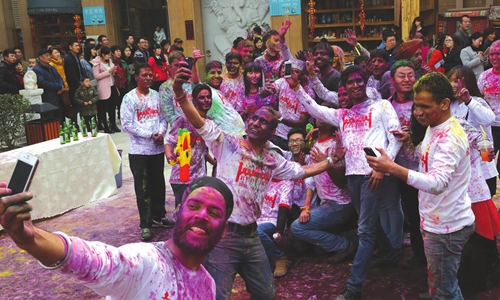HOME >> CHINA
Indian youth pursue their dreams in the booming Chinese IT sector with hope and confusion
By Hu Yuwei Source:Global Times Published: 2019/12/1 18:03:40

Indians living in Xi'an, Northwest China's Shaanxi Province, celebrate the Indian New Year with local residents in 2014. Photo: VCG
"Chinese colleagues often bring me happiness and a sense of belonging. We often have meals and vacations together. It was also this job that opened up my social network in China," said Arjun, an Indian marketing specialist, describing his life in China in fluent Chinese.
His familiarity and closeness to Chinese culture brings him comfort in Chinese social circles.
Arjun never wavered in his decision to work in China even during the 2017 Doklam standoff between China and India. "I was confident that this issue will be dealt by both countries in a mature and amicable manner. Also my Chinese colleagues and friends around me dealt with this situation in a mature manner and such issues did not create any impact on our relationship."
For many Indian workers, Indian and Chinese cultures share many similarities, making them feel self-assured about pursuing their China dreams.
"Both the work cultures have a high focus on progress, learning and hard work and that I think has been a cornerstone of progress for both the nations as well," Ananya (pseudonym), an experienced IT professional working in Northeast China's Liaoning Province, told the Global Times.
She believes it is time that emerging economies like India and China come together and collaborate on issues affecting the future of their growing population to build a stronger foundation for the future.
But some young Indian professionals have noted challenges and cultural differences.
Reyansha, 28-year-old Indian software developer, feels lonely and initially struggled to survive in an unfamiliar culture and lifestyle.
The "9-9-6" culture, a work schedule of 12 hours a day from 9 am to 9 pm, six days a week, is popular in China's tech sector and this is a challenge for Reyansh.
"Hard work is not the same concept for Chinese and Indian people. For most Indians, it is true diligence to be able to start work on time and complete the task efficiently within a set time limit. They are more willing to leave their after-work life to their families," said Reyansh.
Like many Chinese parents, Reyansh's parents are urging him to get married. From their point of view, Reyansh's job in China and decent salary make him more competitive in the matchmaking market. His parents have arranged blind dates for him every time he went back home. No relationships have taken root given the long distances and time differences, but he has started dating women in China.
He is determined to stay in China for at least two more years, with both confusions and hopes regarding the country's potential.
Arjun encourages his Indian friends to come to China and learn more about the country through exchange programs. The popularity of Bollywood films in China opens doors for cultural exchanges, he said, adding that learning Chinese language has never been more popular among Indian youth.
Jayanta Nandi, an Indian senior IT professional who has worked in China for more than a decade, sees himself as a cultural ambassador of sorts, helping bridge the two cultures together.
"Recently, we see the rise of cultural exchanges between India and China. And I feel this will help to understand each other better and more Indians will be eager to come to China, either for travel or for work. And I will also feel happy to see more Chinese people going to India. Travel and work needs to go hand-in-hand," Nandi told the Global Times.
Posted in: IN-DEPTH